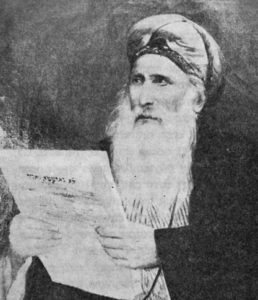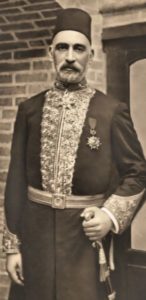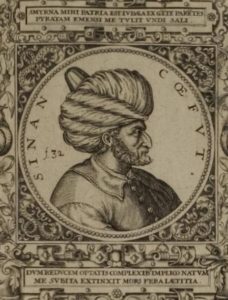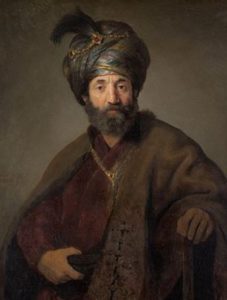The Rabbi Who Captured a Lion, and Saved Israeli Farmers
 Raphael Meir ben Yehuda Panigel (1804-1893) was born in Bulgaria—then part of the Ottoman Empire—the only child of a wealthy and religious Sephardic Jewish family. When he was 3 years old, the family moved to Jerusalem. Despite being orphaned at 15, Panigel soon became a respected rabbi in the Holy City. At just 27 years old, the community appointed him as their official emissary to travel around the world to teach Torah and to collect funds in support of the old yishuv, the Jewish community that struggled to make a living in the Holy Land. In 1845, he was received by Pope Gregory XVI and inspired him to support and protect Jewish communities in Christian lands. Rabbi Panigel made several trips across North Africa, gaining a reputation as a holy miracle-worker. In one famous incident that happened in Tunis, a lion escaped from the city’s zoo and was terrorizing the locals. Incredibly, it was Rabbi Panigel that captured the lion. When he was asked how he did so, he replied that one who is righteous and fears God need not fear anything else. In 1880, Rabbi Panigel was appointed the Rishon LeZion, Sephardic chief rabbi of Israel, and in 1890, the Ottomans made him hakham bashi, chief authority representing the Jewish community. He composed a penetrating work called Lev Marpe with novel Torah and Talmudic insights. He was also instrumental in developing heter mechira, allowing Jewish farmers in Israel to continue working during the Sabbatical shemitah year (such as this year) in a kosher way. As the shemitah of 1889 approached, the struggling Jewish immigrants of the First Aliyah worried how they would survive if they had to let the land lie fallow, considering the country was then completely undeveloped. After consultations with other Torah luminaries, Rabbi Panigel found a way to work around the shemitah restrictions, allowing the faithful farmers to survive while also adhering to Torah law. Rabbi Panigel was the first to institute heter mechira, a practice which continues in Israel to this day. Eliezer Ben-Yehuda, the famous “father of Modern Hebrew”, wrote of how he was inspired by Rabbi Panigel and described him as being of “electrifying” holiness, like one of the Biblical Patriarchs.
Raphael Meir ben Yehuda Panigel (1804-1893) was born in Bulgaria—then part of the Ottoman Empire—the only child of a wealthy and religious Sephardic Jewish family. When he was 3 years old, the family moved to Jerusalem. Despite being orphaned at 15, Panigel soon became a respected rabbi in the Holy City. At just 27 years old, the community appointed him as their official emissary to travel around the world to teach Torah and to collect funds in support of the old yishuv, the Jewish community that struggled to make a living in the Holy Land. In 1845, he was received by Pope Gregory XVI and inspired him to support and protect Jewish communities in Christian lands. Rabbi Panigel made several trips across North Africa, gaining a reputation as a holy miracle-worker. In one famous incident that happened in Tunis, a lion escaped from the city’s zoo and was terrorizing the locals. Incredibly, it was Rabbi Panigel that captured the lion. When he was asked how he did so, he replied that one who is righteous and fears God need not fear anything else. In 1880, Rabbi Panigel was appointed the Rishon LeZion, Sephardic chief rabbi of Israel, and in 1890, the Ottomans made him hakham bashi, chief authority representing the Jewish community. He composed a penetrating work called Lev Marpe with novel Torah and Talmudic insights. He was also instrumental in developing heter mechira, allowing Jewish farmers in Israel to continue working during the Sabbatical shemitah year (such as this year) in a kosher way. As the shemitah of 1889 approached, the struggling Jewish immigrants of the First Aliyah worried how they would survive if they had to let the land lie fallow, considering the country was then completely undeveloped. After consultations with other Torah luminaries, Rabbi Panigel found a way to work around the shemitah restrictions, allowing the faithful farmers to survive while also adhering to Torah law. Rabbi Panigel was the first to institute heter mechira, a practice which continues in Israel to this day. Eliezer Ben-Yehuda, the famous “father of Modern Hebrew”, wrote of how he was inspired by Rabbi Panigel and described him as being of “electrifying” holiness, like one of the Biblical Patriarchs.
What is Shemitah, the Sabbatical Year?
Words of the Week
The only way to deal with an unfree world is to become so absolutely free that your very existence is an act of rebellion.
– Albert Camus


 Sinan Reis (c. 1492-1546) was born to a Sephardic family that was expelled from Spain during the Expulsion of 1492 and settled in the Ottoman city of Smyrna. At the time, many Jews became pirates, attacking Spanish vessels both for revenge and to reclaim some of their confiscated wealth. Sinan joined the Barbary corsair pirates that sailed under the Ottoman flag. He became the right-hand man of the well-known pirate and Ottoman admiral Hayreddin Barbarossa. The two fought and won many battles against the Spanish and the Holy Roman Empire. The most famous was the Battle of Preveza in 1538. Barbarossa took Sinan’s military advice, leading to a magnificent Ottoman victory. Two years later, Sinan’s young son was captured at sea and forcibly baptized. The Christians refused to release him to the “infidels”, so Barbarossa led a fleet to bombard the Italian city of Piombino until Sinan’s son was finally freed. Barbarossa later dedicated his memoirs to Sinan, who was often referred to as Sinan Reis or Rayyis, Arabic for “chief”. Historical records from England describe him as “the famous Jewish pirate”, while the governor of Portuguese India at the time called him “the Great Jew”. Sinan went on to become Supreme Naval Commander of the Ottoman fleet.
Sinan Reis (c. 1492-1546) was born to a Sephardic family that was expelled from Spain during the Expulsion of 1492 and settled in the Ottoman city of Smyrna. At the time, many Jews became pirates, attacking Spanish vessels both for revenge and to reclaim some of their confiscated wealth. Sinan joined the Barbary corsair pirates that sailed under the Ottoman flag. He became the right-hand man of the well-known pirate and Ottoman admiral Hayreddin Barbarossa. The two fought and won many battles against the Spanish and the Holy Roman Empire. The most famous was the Battle of Preveza in 1538. Barbarossa took Sinan’s military advice, leading to a magnificent Ottoman victory. Two years later, Sinan’s young son was captured at sea and forcibly baptized. The Christians refused to release him to the “infidels”, so Barbarossa led a fleet to bombard the Italian city of Piombino until Sinan’s son was finally freed. Barbarossa later dedicated his memoirs to Sinan, who was often referred to as Sinan Reis or Rayyis, Arabic for “chief”. Historical records from England describe him as “the famous Jewish pirate”, while the governor of Portuguese India at the time called him “the Great Jew”. Sinan went on to become Supreme Naval Commander of the Ottoman fleet.